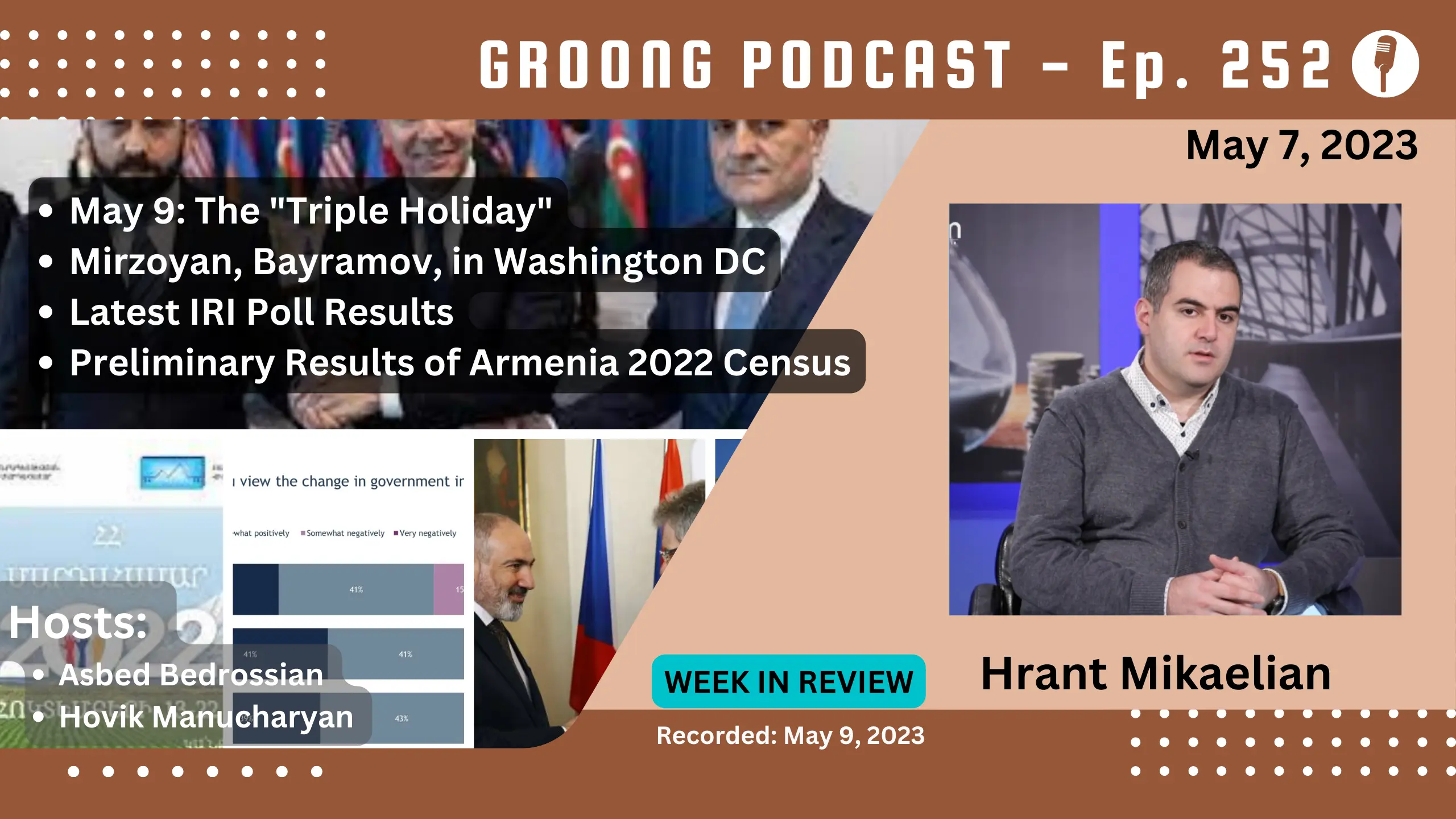
Guest:
Topics:
- Armenia-Azerbaijan Negotiations Continue
- Latest IRI Armenia Poll Results
- Armenian Census 2022 - Preliminary Results
Episode 252 | Recorded: May 9, 2023
Show Notes
May 9: The “Triple Holiday”
Today is May 9, which in Armenia is a major holiday called the triple-holiday, combining Victory Day (the allied victory in WWII), the establishment of the self-defense forces of Artsakh (1992), and the day of liberation of Shushi (also in 1992). Obviously, in past times it was a much more joyous occasion.
We know there were events both in Armenia and Artsakh.
Questions:
- What does it mean to have the May 9 holiday in the situation that Armenia is in today? Is it really a celebration or more of a commemoration?
- What are the differences in the ways that Artsakh and Armenia observe this holiday now?
Armenian-Azerbaijani Negotiations Continue
Undoubtedly the big story of this past week was the lightning-fast coordinated meeting of the foreign ministers of Armenia and Azerbaijan in DC, under the auspices of the US Secretary of State Anthony Blinken. The results vary depending on who you ask.
Meanwhile, yesterday a summit was announced in Brussels between Aliyev, Pashinyan and EU co-president Charles Michel. And today, Pashinyan was in Moscow.
Mirzoyan, Bayramov, Washington DC
The DC meeting materialized on calendars very suddenly, after Armenia had confirmed a meeting of the foreign ministers in Moscow. It happened so fast that everyone and probably including the Russian MFA were momentarily confused as to who’s meeting whom and where. Next thing we know Ararat Mirzoyan was meeting Jeyhun Bayramov in DC for 3+ days, which yielded uncertain results.
At the end Blinken assessed the progress made as “significant”, while Pashinyan was less enthusiastic, assessing the distance in terms of reaching agreement between the two sides as 990 meters to the previous 1,000.
Apparently the major areas of differences are about the international security mechanisms for Artsakh, and also about Azerbaijan’s willingness to recognize Armenian sovereignty on Pashinyan’s “29,800” sq.km. And by the way, these differences were confirmed just yesterday by national security chair Armen Grigoryan, who said that there was no progress on those issues.
Questions:
- Given what we’ve read, it seems like Pashinyan’s assessment of the progress achieved was rather modest. What are your thoughts?
- One of the themes of the talks was the “rights and security of the Karabakh people”, as Blinken put it. Does this mean that all three sides are dealing with the issue of the Artsakhtsis as a minority inside Azerbaijan? Also, what are your thoughts about a statement by Blinken, which was later edited out, mentioning ethnic minorities in the region in general.
- Given that Pashinyan has said that Stepanakert should talk to Baku directly, what right or mandate does he have to negotiate the rights and security of Artsakhtsis?
Pashinyan in Prague
Pashinyan commented on the Washington talks during his state visit to Prague. He also spoke at the Prague Center for Transatlantic Relations.
An audience member asked Pashinyan why Armenia was not applying the principle of “Remedial Secession”. Pashinyan completely failed to answer the question and simply babbled on his “commitment to negotiations” despite Baku’s “intentions of ethnic cleansing”. He pretty much made the point for the questioner that Remedial Secession should be exercised.
Question:
- Is this a viable option for Artsakh, and why doesn’t Armenia support it?
Pashinyan took the opportunity of a question to further bash Russia and the CSTO as having failed in their obligations to Armenia. Then he said he will be in Moscow and yesterday, Monday, he was in fact in Moscow.
At the same time, the EU issued a press-release announcing a meeting in Brussels on May 14 between Pashinyan, Aliyev, and Charles Michel together with President Emmanuel Macron of France and Chancellor Olaf Scholz of Germany. So things are moving fast.
Today we also read that there may be yet another trilateral summit between Pashinyan and Aliyev in Moscow, after the Brussels summit. This time with Putin.
Questions:
- What about Brussels, this coming Sunday?
- What expectations should there be from Pashinyan’s trip to Moscow?
Latest IRI Poll Results
In April James DeWitt, the director of the Armenian branch of the International Republican Institute (IRI), was in Yerevan, probably to inform the Armenian authorities that their latest poll results would be out shortly, and well the results didn’t look good for them.
See also: Опрос IRI в Армении: большинство недовольно текущей ситуацией by Hrant Mikaelian
Post-2018 Euphoria / Direction of Country
Post-Revolutionary Euphoria
Hrant, you performed a comparative analysis of post-revolutionary “euphoria” using data from this poll, looking at data from Ukraine, Georgia, Moldova, Tunisia and Armenia. What can you tell us about the similarities and differences in euphoria in these countries?
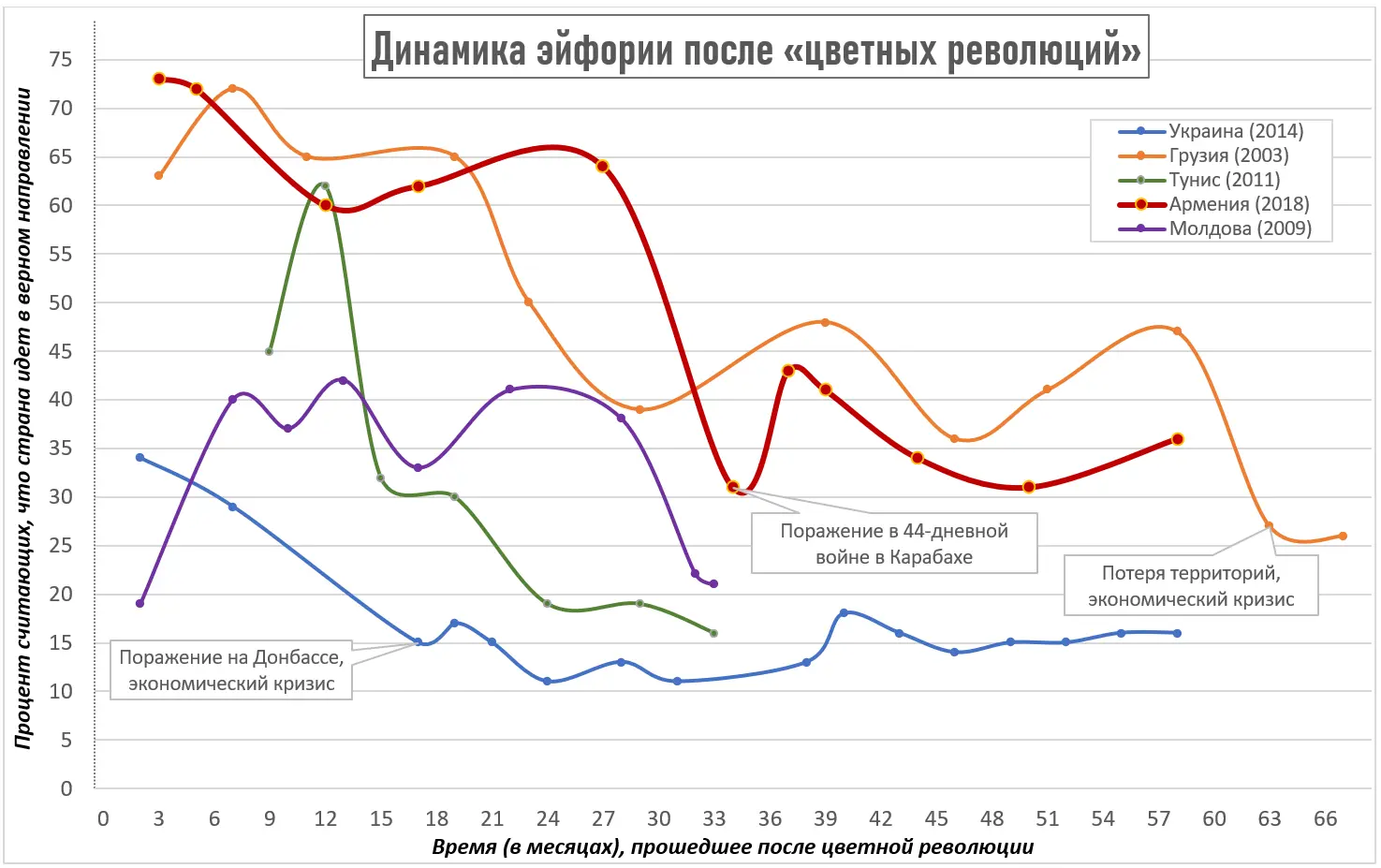
Question:
- Your analysis shows an awfully similar trajectory among the countries you compared. What can be deduced?
Slide 7: Generally speaking, do you think that Armenia is heading in the right direction or the wrong direction?
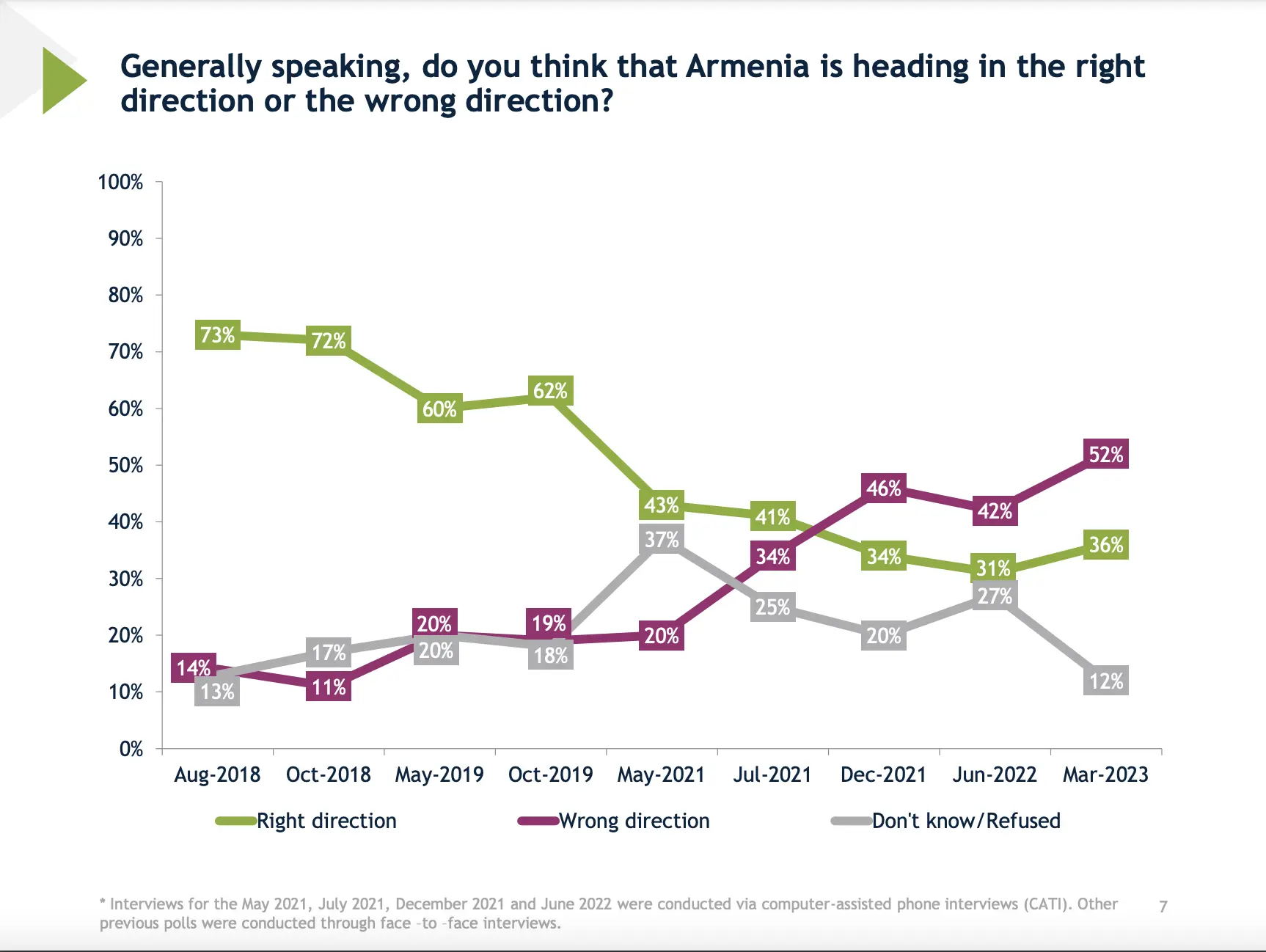
Questions:
- Nearly 52% (the majority of the country) of the respondents say that the country is going in the wrong direction (compared with 14% in 2018). Is this a dangerous statistic for the Pashinyan regime and does this statistic pose a threat to internal stability?
- You also looked at these numbers in detail based on the disaggregation group. What did you learn from that analysis?
Trust In Institutions
Slide 21: How satisfied or dissatisfied are you with the work of the following institutions?
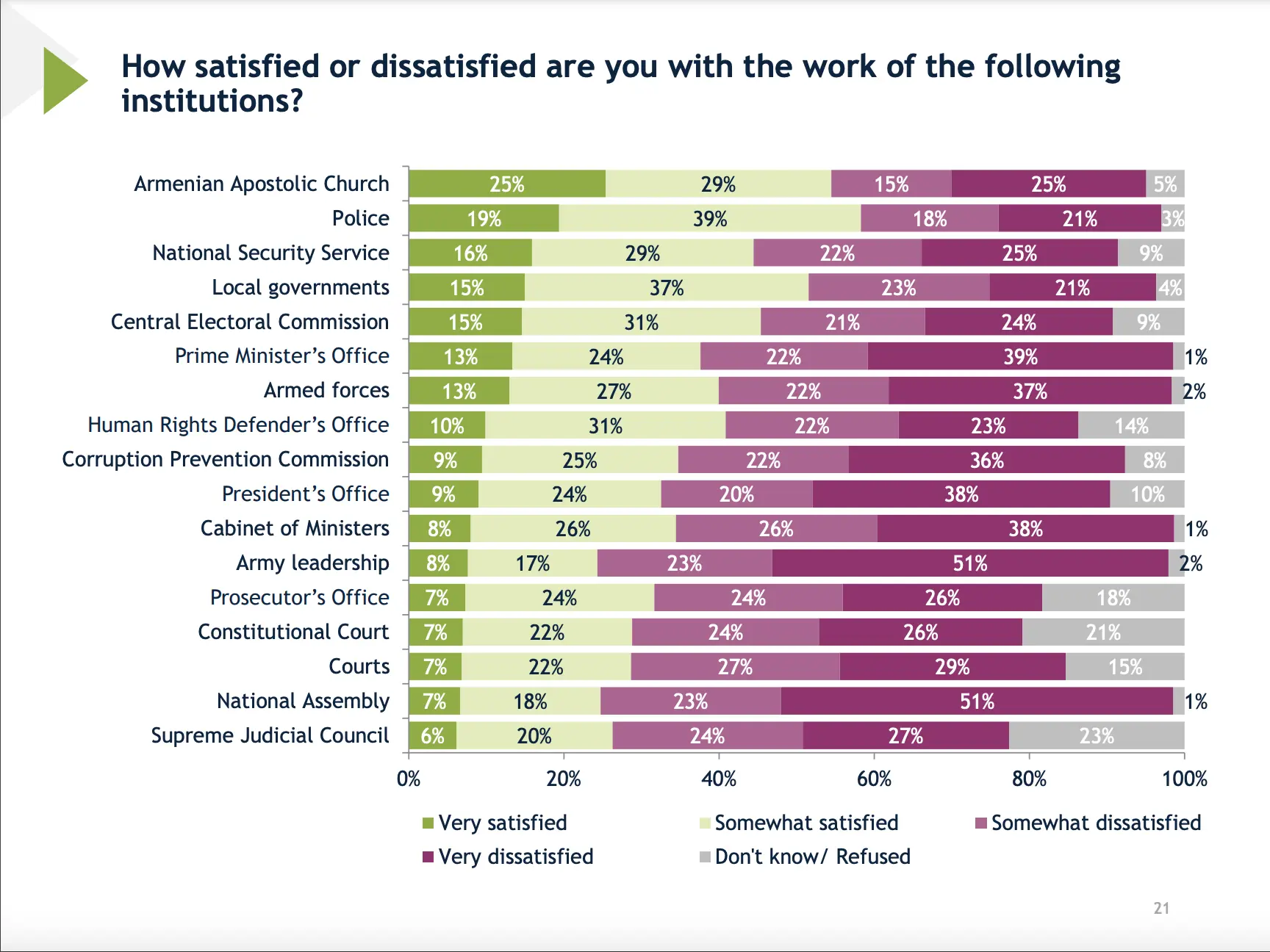
Only church and police get more than 50% approval ratings. All others do not pass.
Questions:
- What is your overall observation of these results?
- What is the likelihood of the church taking the mantle of the struggle for Artsakh?
Slide 25: How satisfied or dissatisfied are you with the work of the Armed forces?
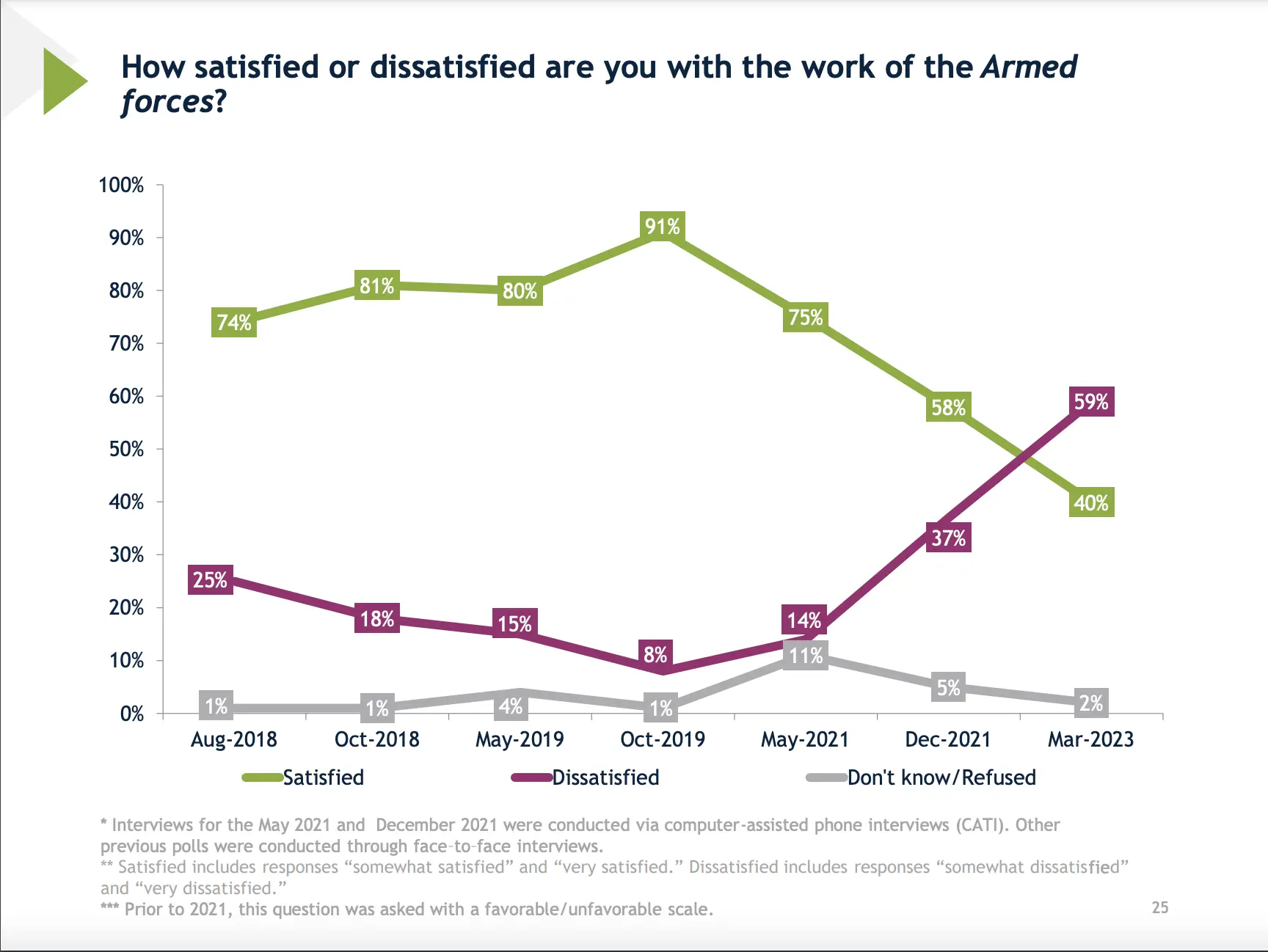
The drop in the rating of the Army seems to be continuing to plummet. In 2019, the army had a 91% approval rating and was the #1 institution. Today, it has a 40% approval rating and a 59% antirating.
Question:
- Is there a direct relationship between trust in the armed forces and people’s trust in their own security? What are the dangers of such a drop in perception?
Slide 22: How satisfied or dissatisfied are you with the work of the Police?
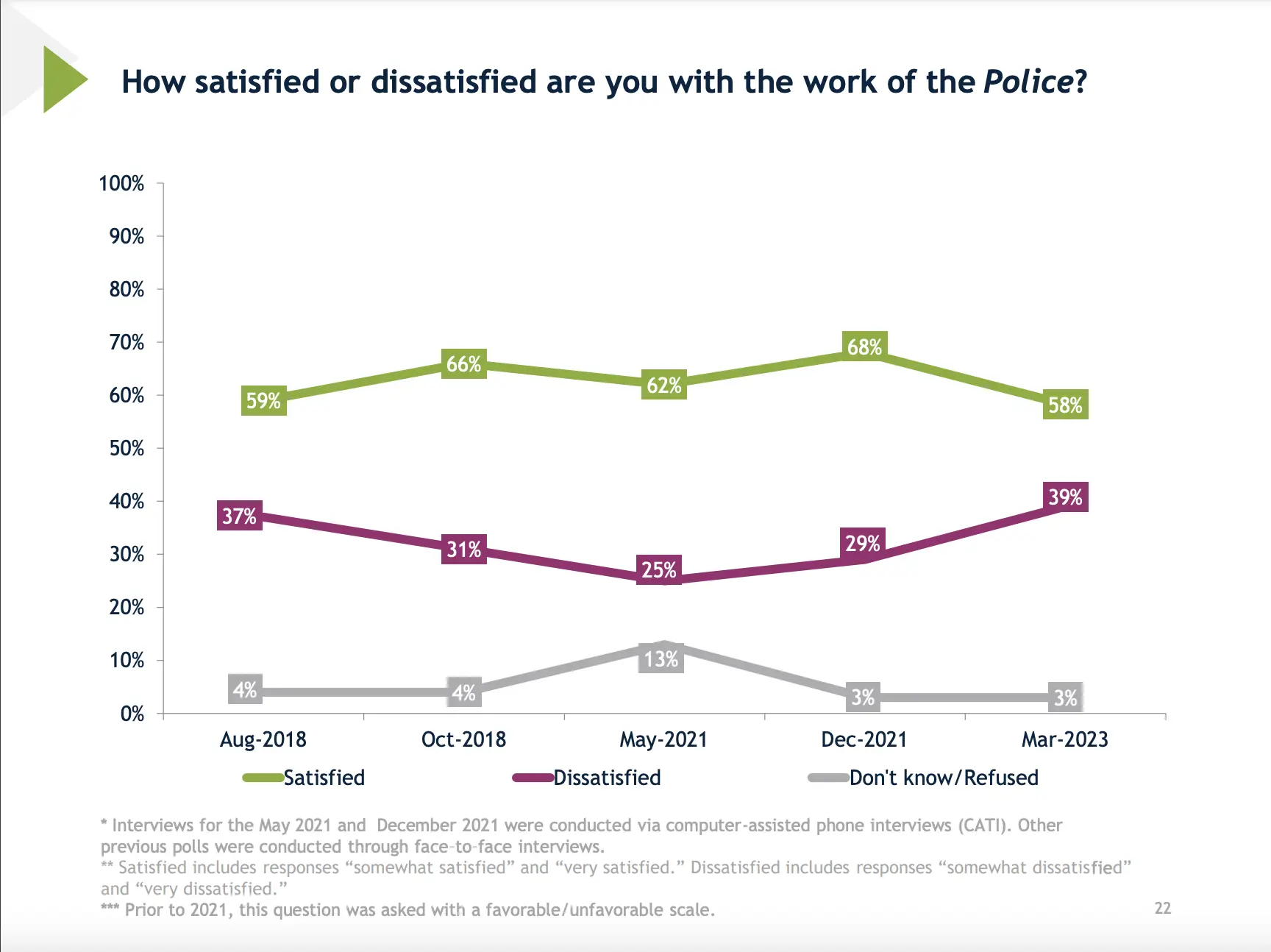
Question:
- Huge jump in negative view of the police in public perception. Yet the government raves about it. How come?
Greatest Achievements and Failures
Slide 41: What do you think is the biggest success of the government during the last 6 months?
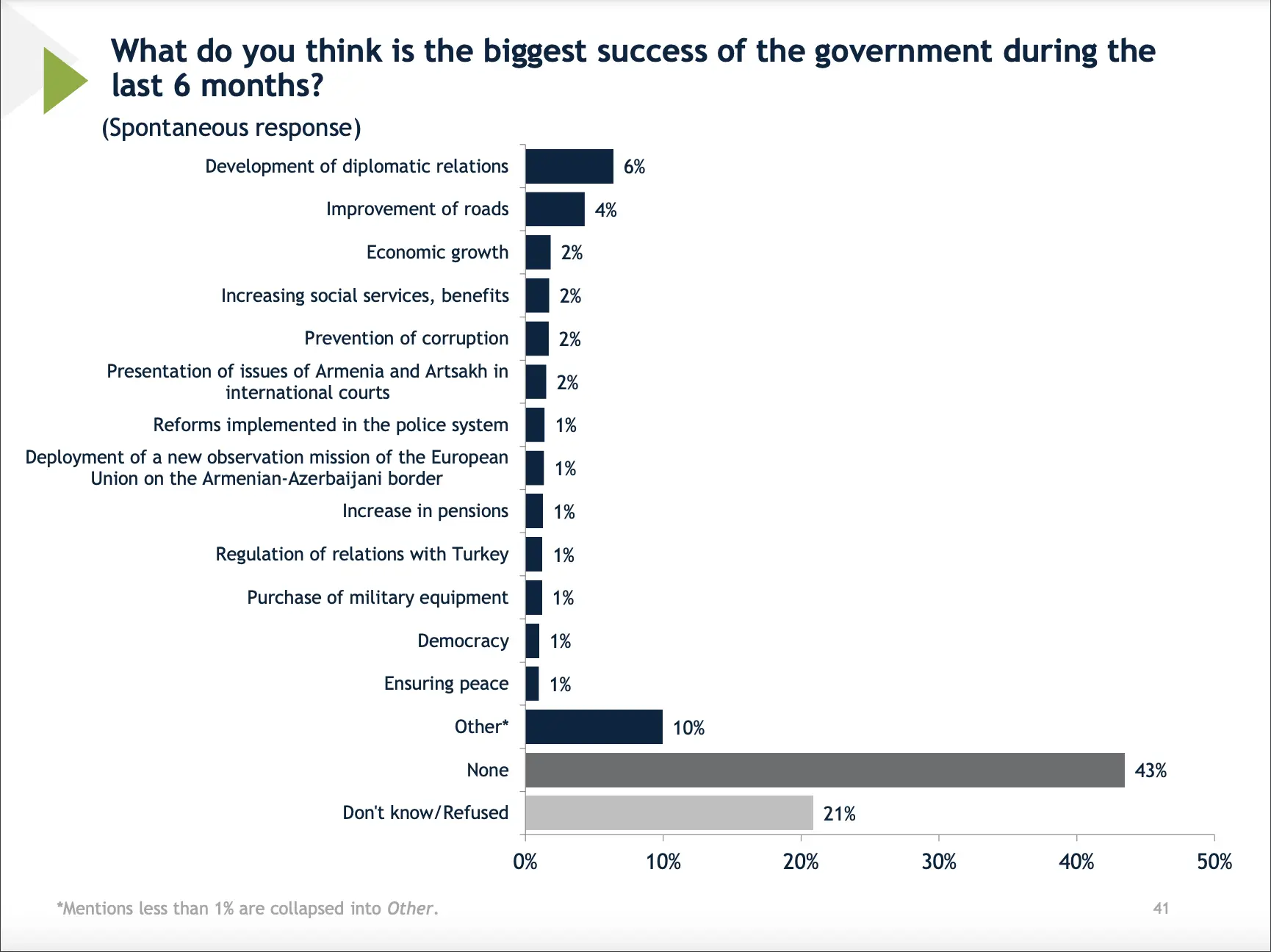
Slide 42: What do you think is the biggest failure of the government during the last 6 months?
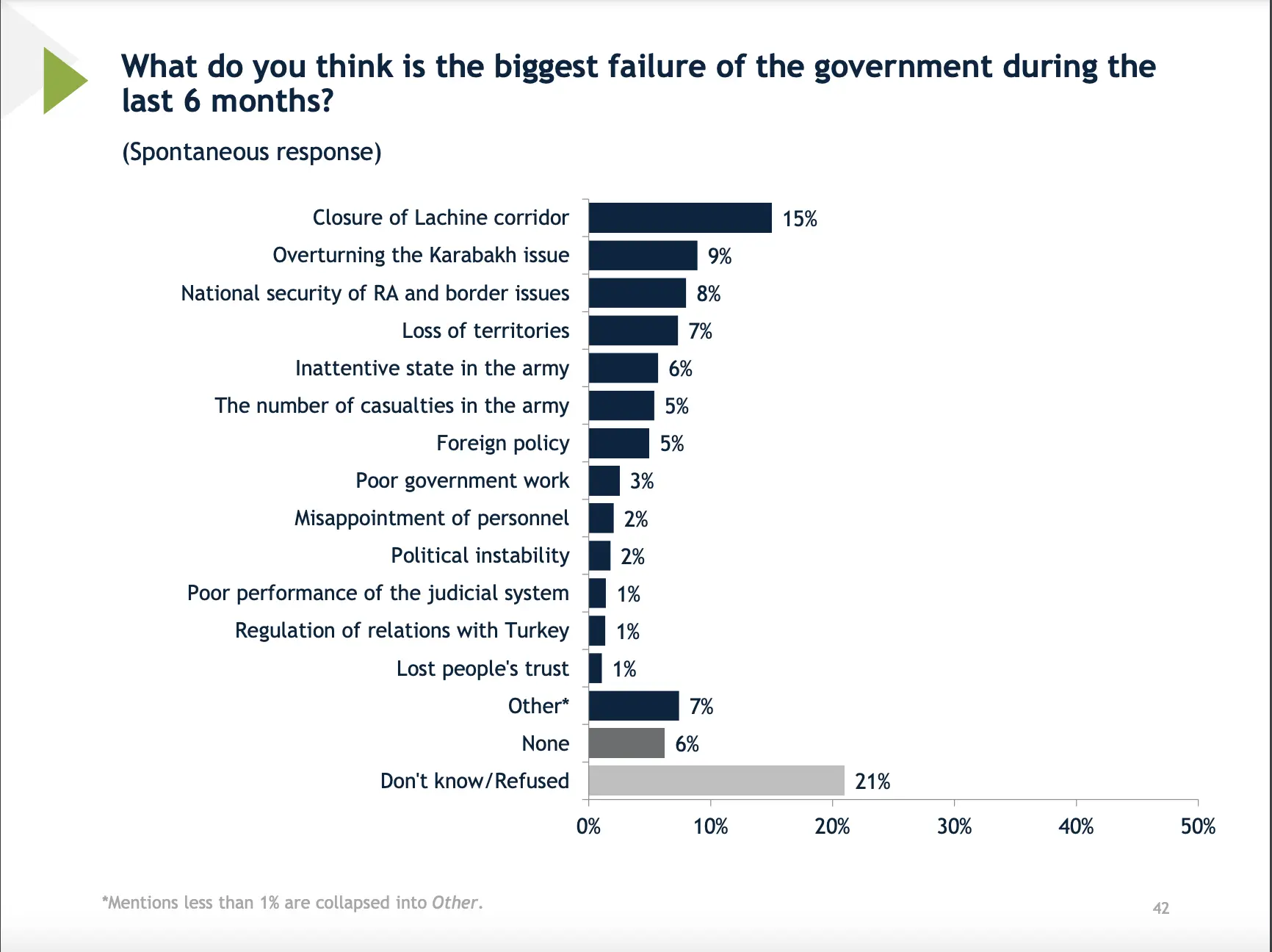
To the question: What are the greatest achievements of this government, three quarters of the respondents could not say what they would be. 42% said “none”, 21% said “hard to say”, and 10% said “other”. Those who mentioned achievements listed things like “diplomatic ties”, “road improvements”, etc. and all items were in the single figures.
Meanwhile to the question of what the greatest failures of this government were, 55% of the respondents listed items concerning national security in one form or another, for example, the closure of the Lachin/Berdzor corridor, the failure of the cause of Artsakh, border security, territorial losses, uncertain state of the armed forces, losses in the army, and foreign policy. 6% of respondents said there were no failures by the government, and 21% said it was hard to say.
Additionally, respondents listed these same failures as line items that need to be improved in the coming 6 months.
Questions:
- Respondents seem to be clear in saying that this government has completely failed in its constitutional mission to protect the country and its citizens. How will this message be heard by Pashinyan and his cohort?
- Could there be consequences in 6-12 months, if the government hasn’t addressed these issues as indicated in Question/slide 43? For example, could failure translate to certain consequences in the Yerevan mayoral elections?
Perceptions of Fight Against Corruption
Slide 34: How do you feel about the direction of the fight against corruption during the past six months?
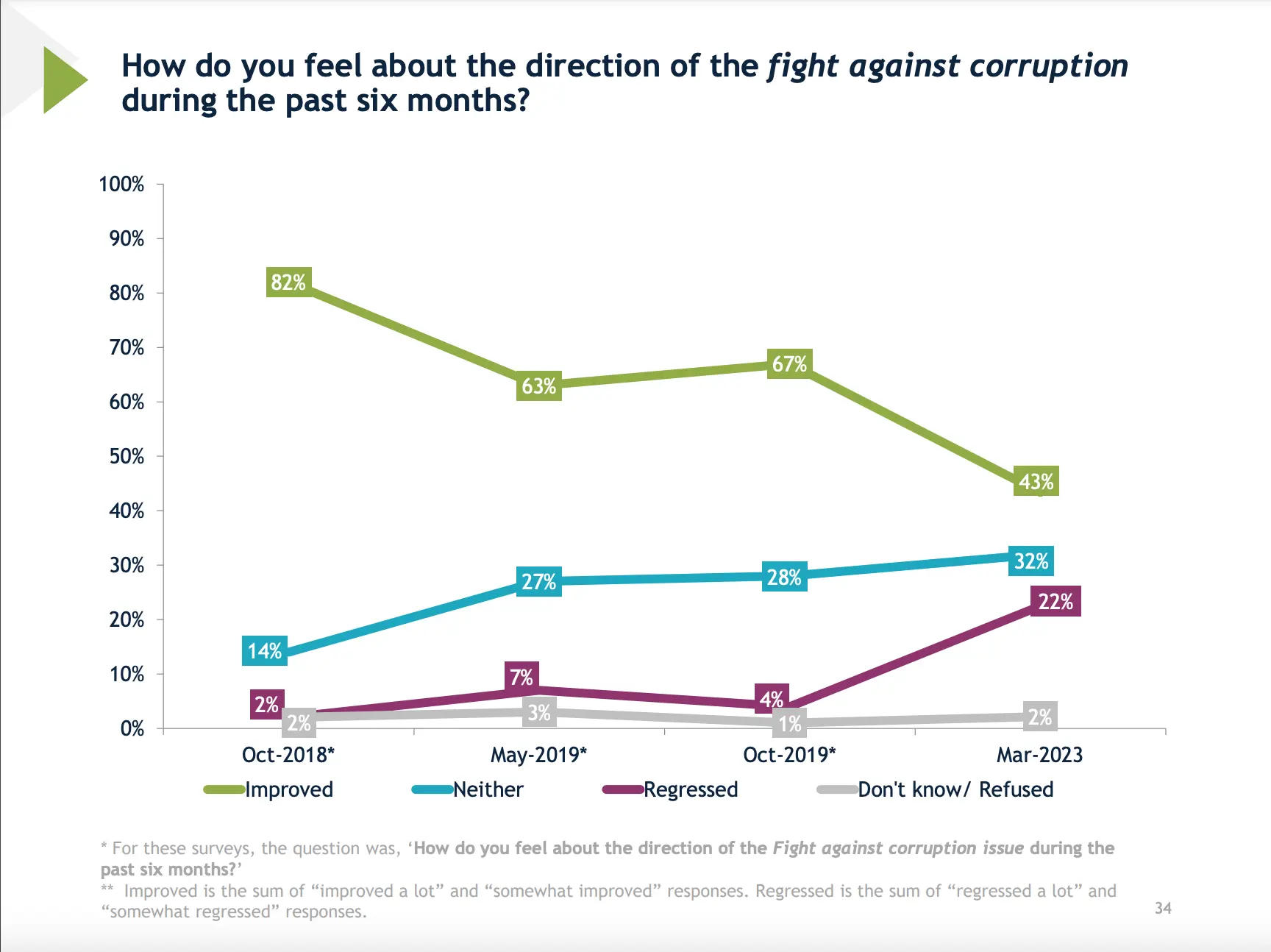
Slide 48: What government led anti-corruption reforms do you know?
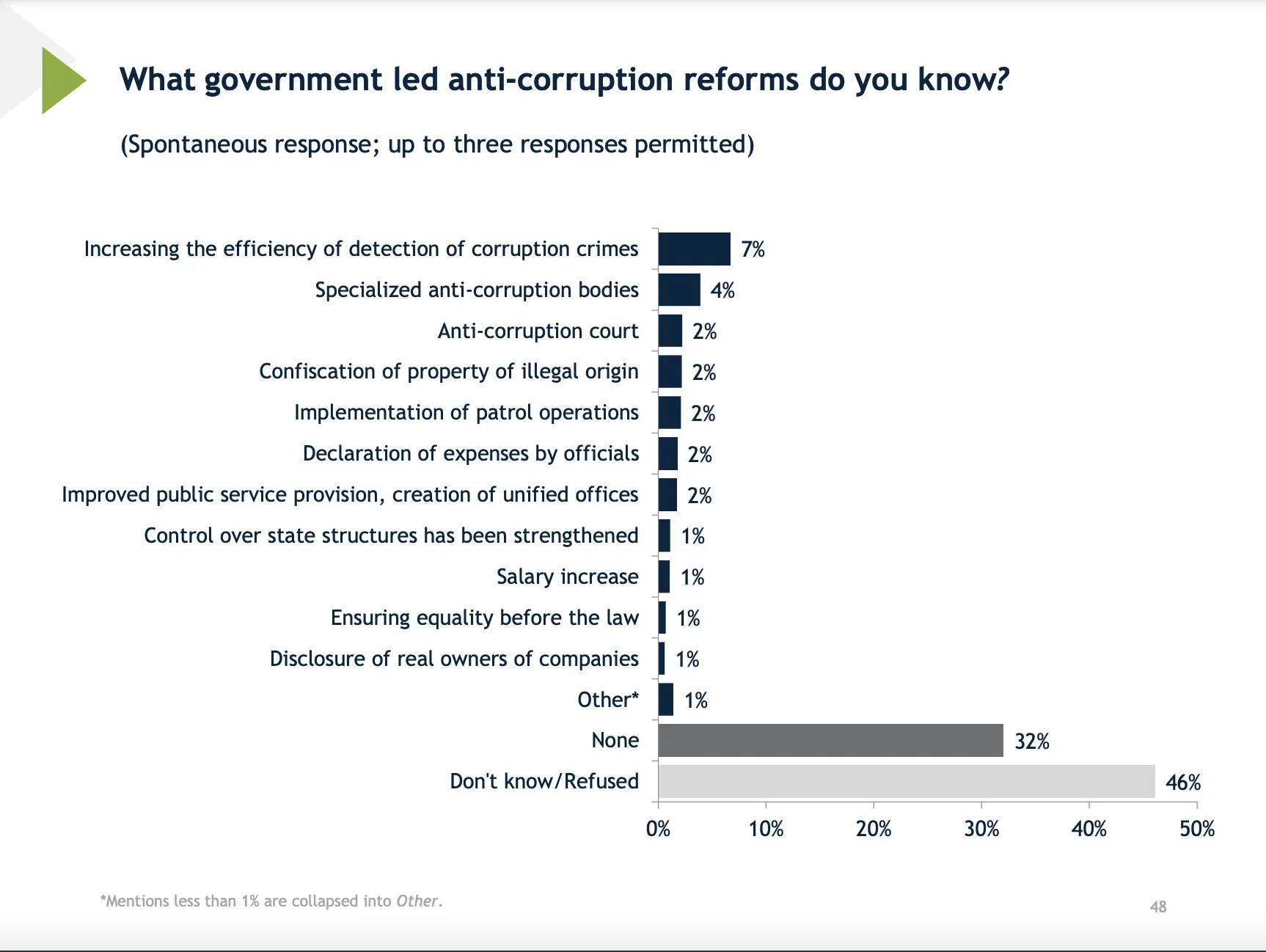
Slides 34 & 48: The ruling party’s flagship cause is anti-corruption. Pashinyan came to power in 2018 promising a complete eradication of corruption. Last year in fact he claimed that “systemic corruption” no longer existed in Armenia: This poll indicates that 79% believe either there is no progress, or can’t say what progress there is. All progress areas are in single-figures.
Question:
- How come?
Perceptions of the Economy
Slide 39: How do you feel about the direction of the economy during the past six months?
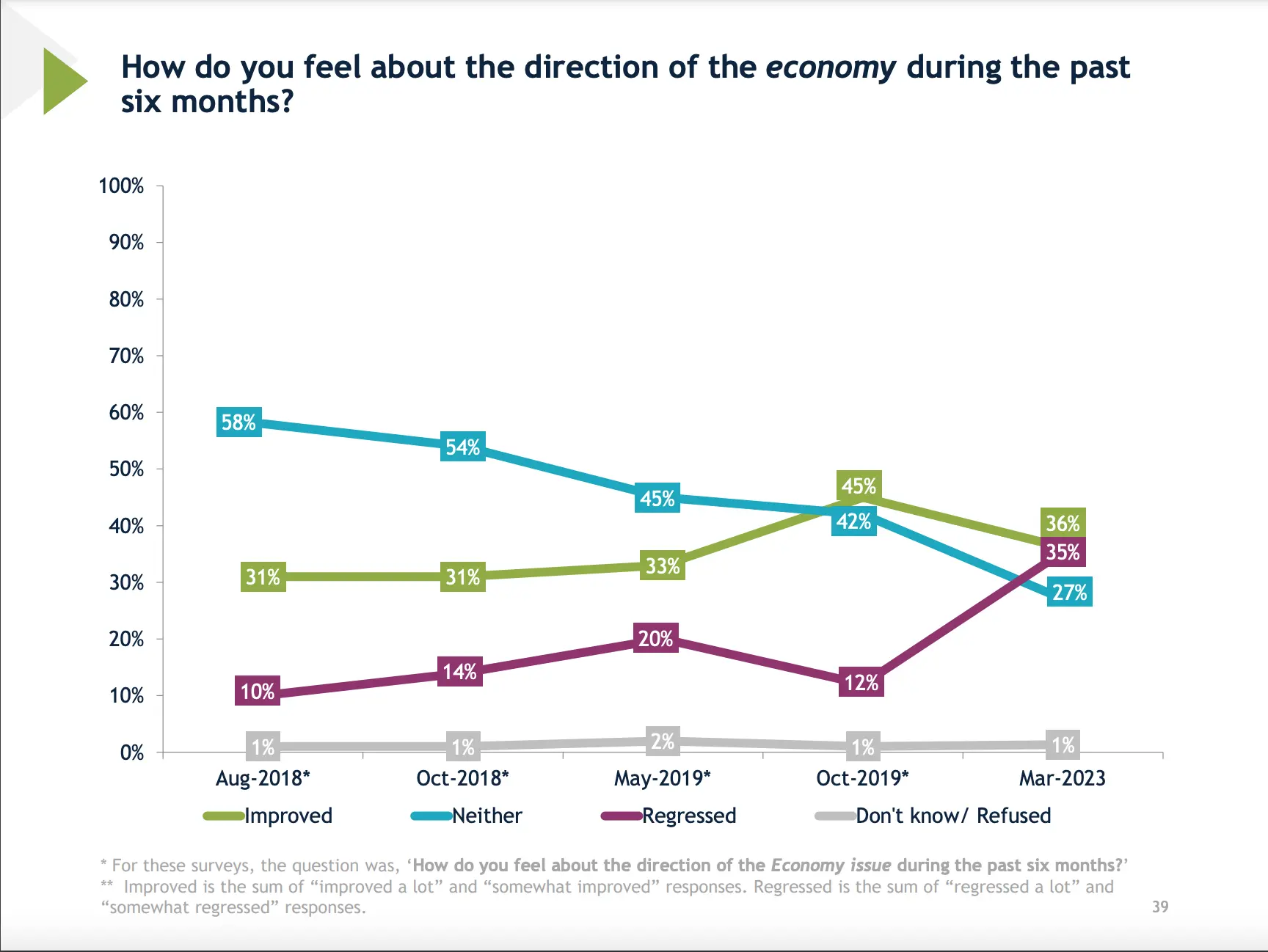
According to the government there was a near 14% growth in the economy last year, yet people feel the economy is doing worse now.
Question:
- Hrant in the past we have noted this on our show, how the economic growth is not translating down to a more favorable life for the majority of the people. What do you attribute this to?
NOTE: WE DID NOT GET TO THE SLIDES BELOW IN THE SHOW DUE TO TIME CONSTRAINTS, SKIP TO THE “CENSUS” SECTION.
Slide 24: How satisfied or dissatisfied are you with the work of the Prime Minister’s Office?
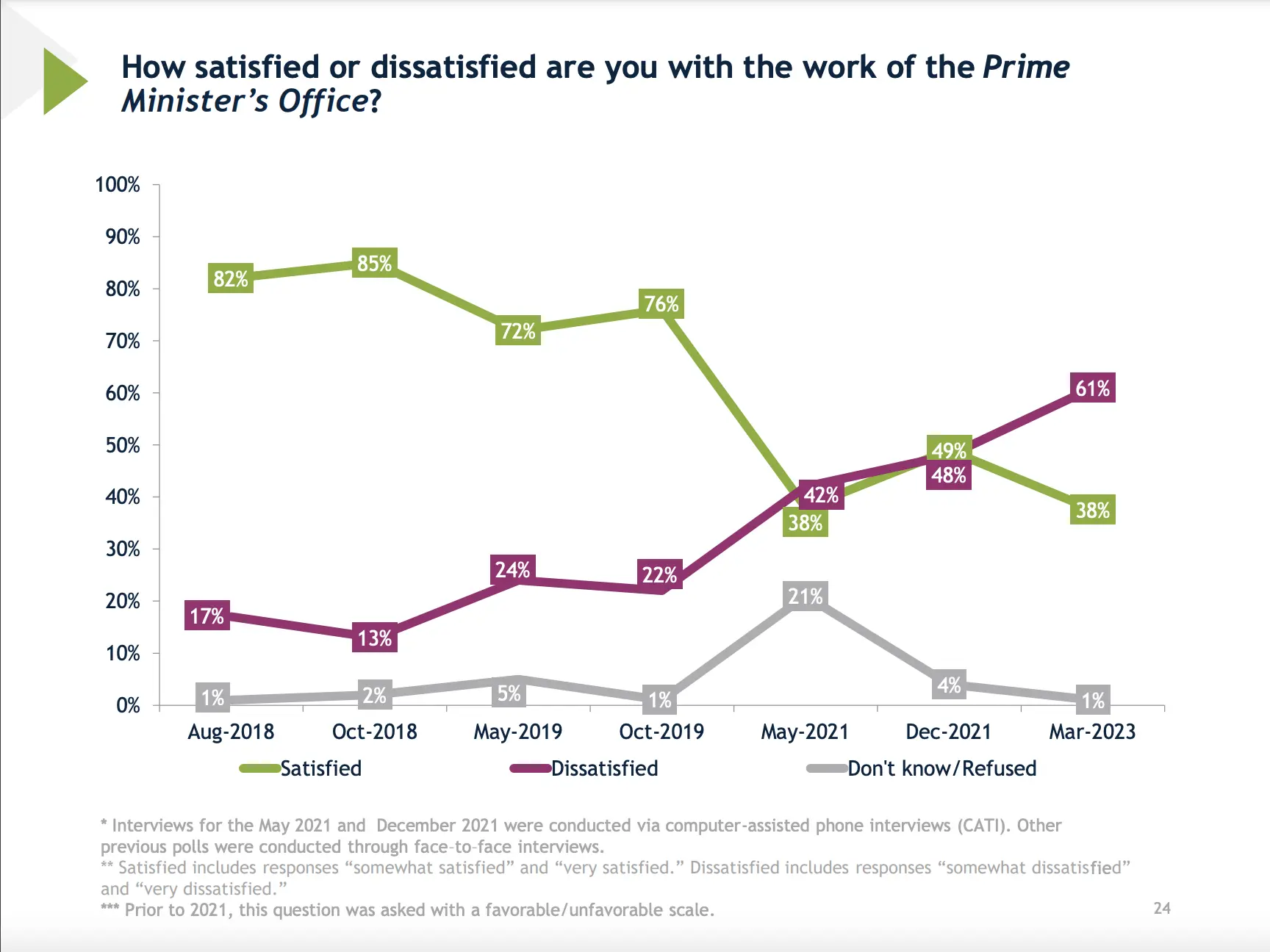
Pashinyan approval tanks from 82% to 38%, disapproval goes 17→ 61% while civil contract polls at a max of 21% in slides 18 & 19.
Political Parties & Public Figures
The questions about political parties and political figures show a continuing decline in the ratings of all major players across the board, specifically considering Nikol Pashinyan and his Civil Contract party, as well as the parliamentary opposition.
Slide 17: Which politician or public person do you trust the most? And the second most?

Slide 18: Which political party or alliance, if any, you would vote for if national parliamentary elections were held next Sunday?
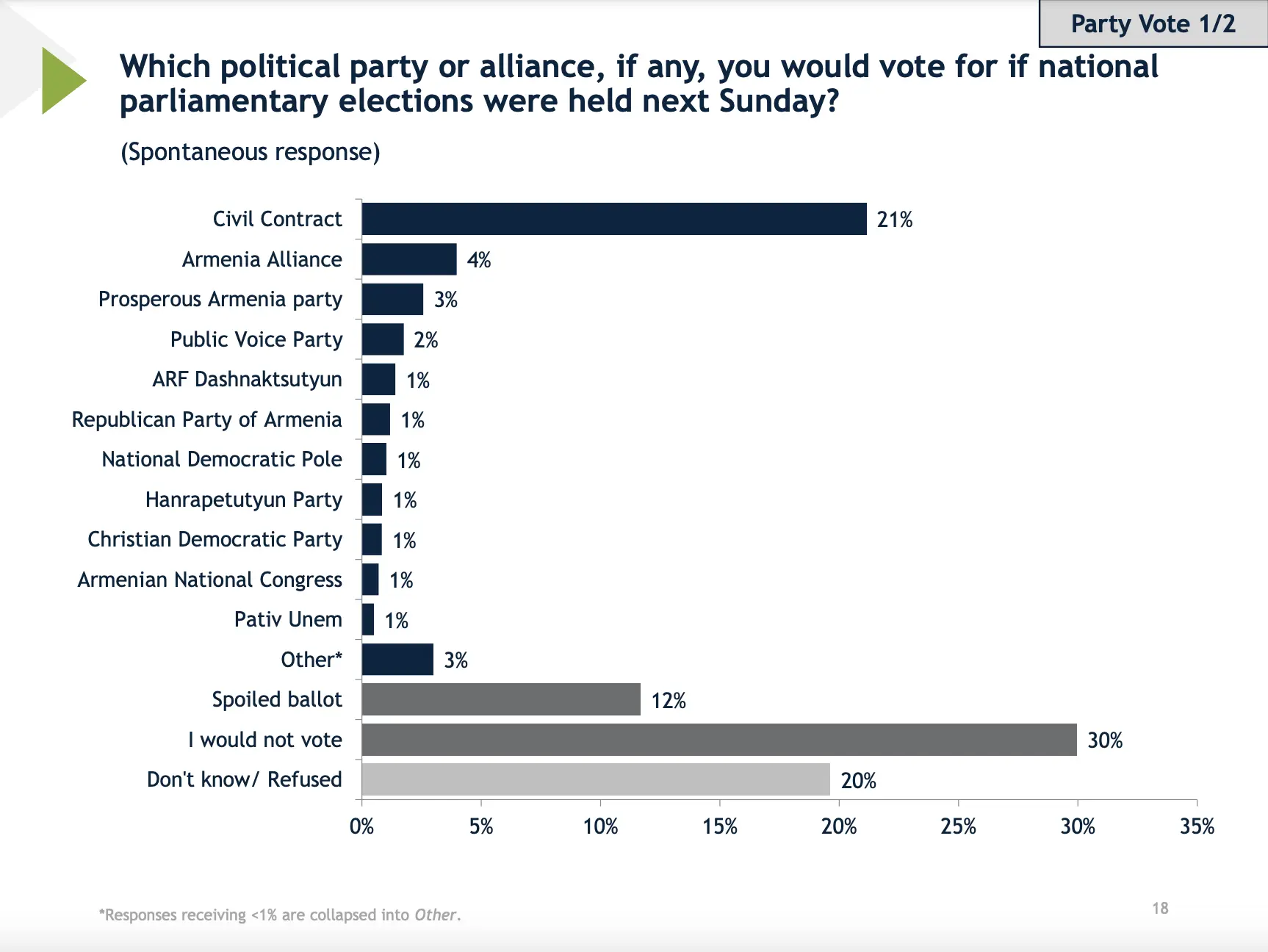
Question:
- Pashinyan’s rating is down ?????
Slide 19: Which political party or alliance, if any, you would vote for if national parliamentary elections were held next Sunday?* 2/2
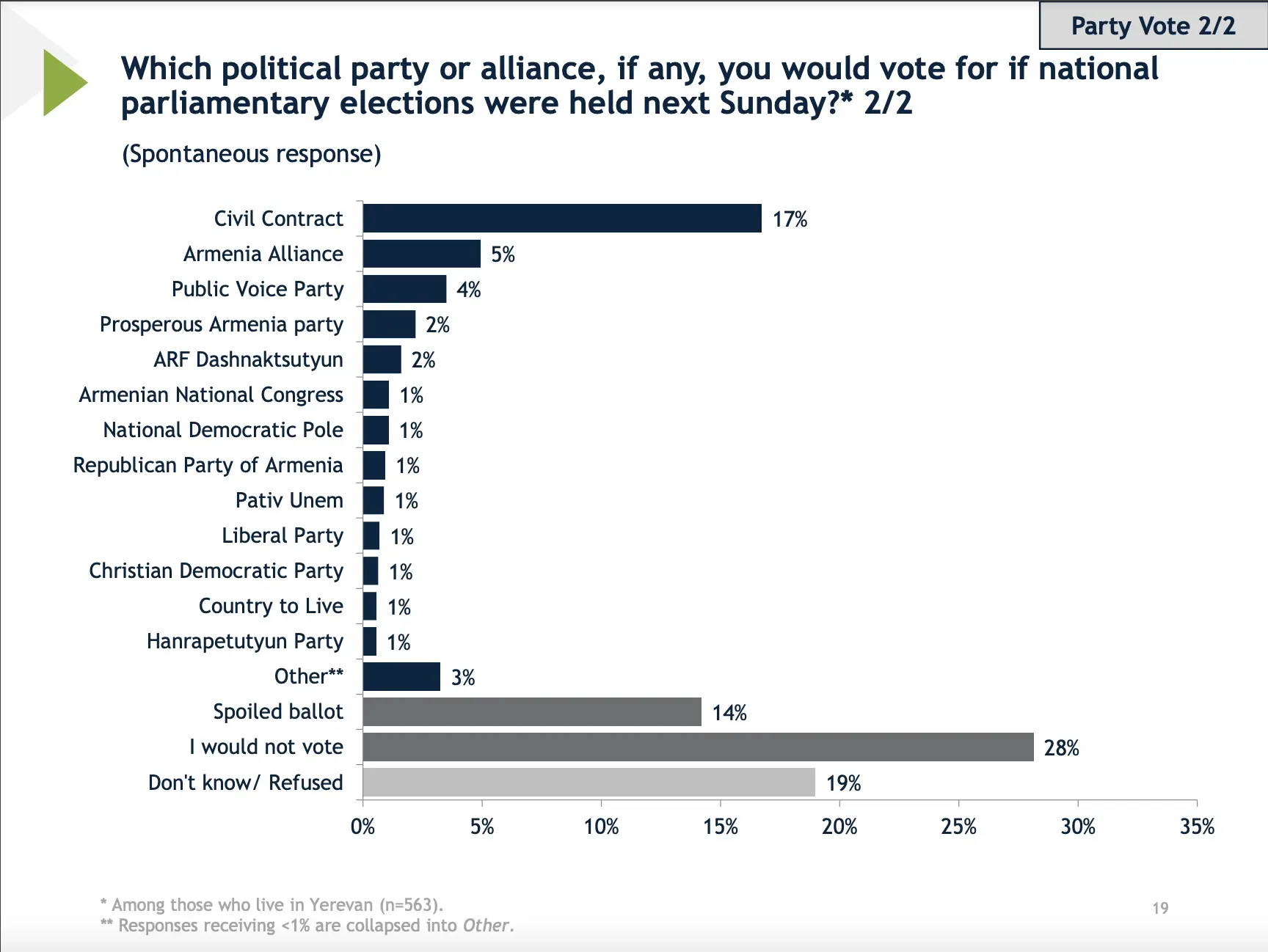
Slide 20: Which political party or alliance, if any, you would vote for if national parliamentary elections were held next Sunday?
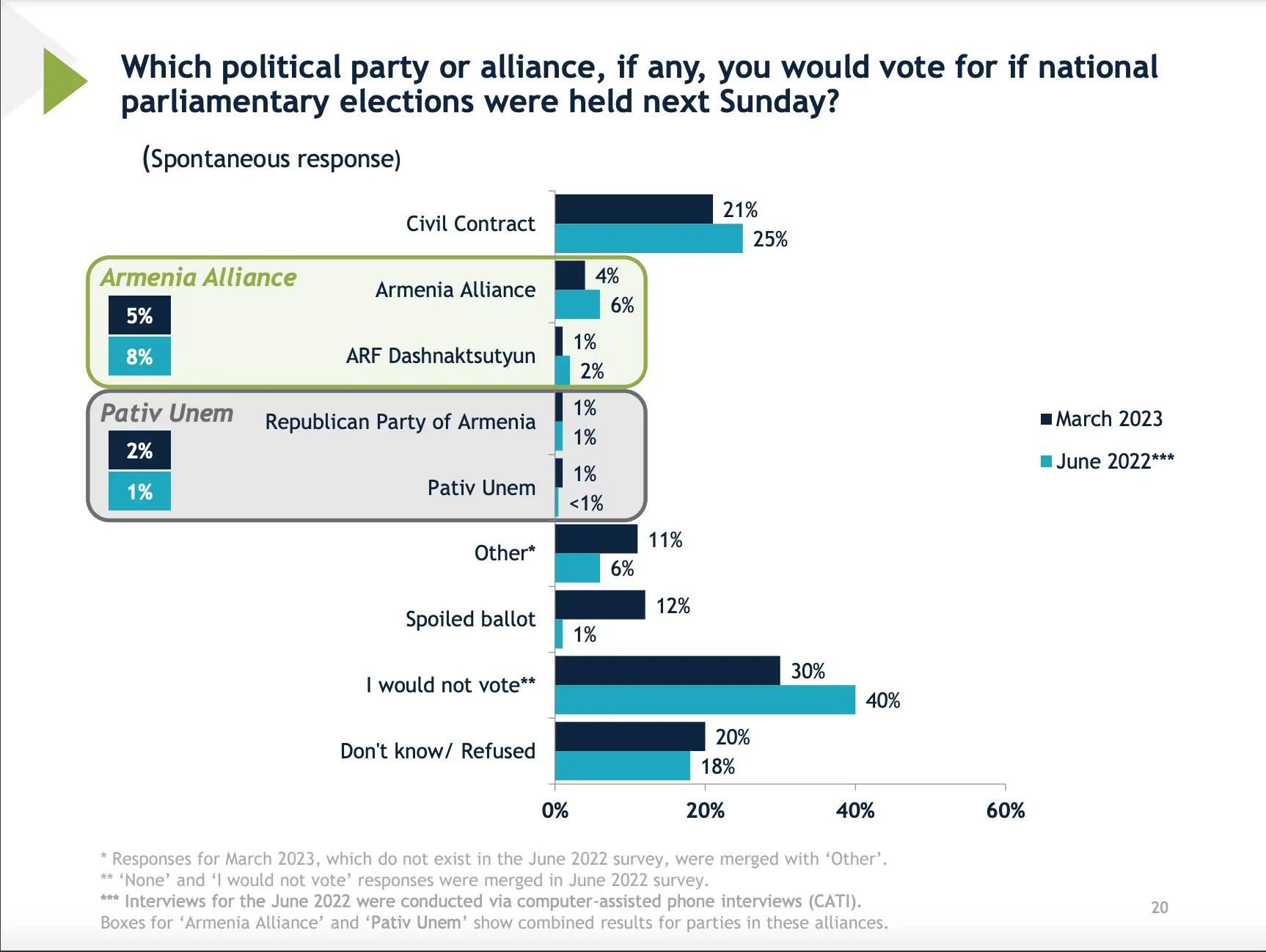
The Pollster and The Poll
Slide 50: How would you evaluate the current state of the relationship between Armenia and …?
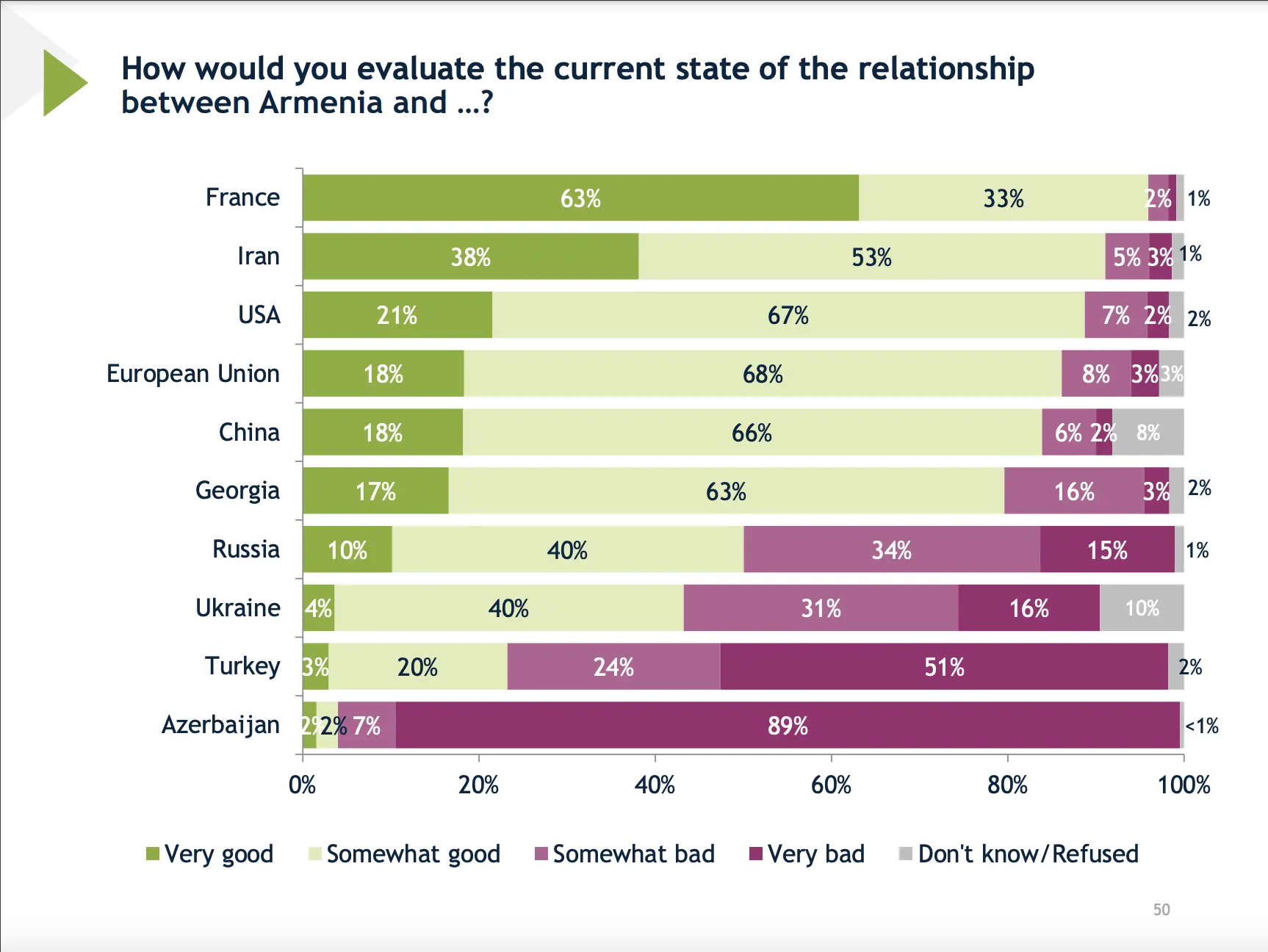
Slide 60: How would you evaluate the current state of the relationship between Armenia and Turkey?
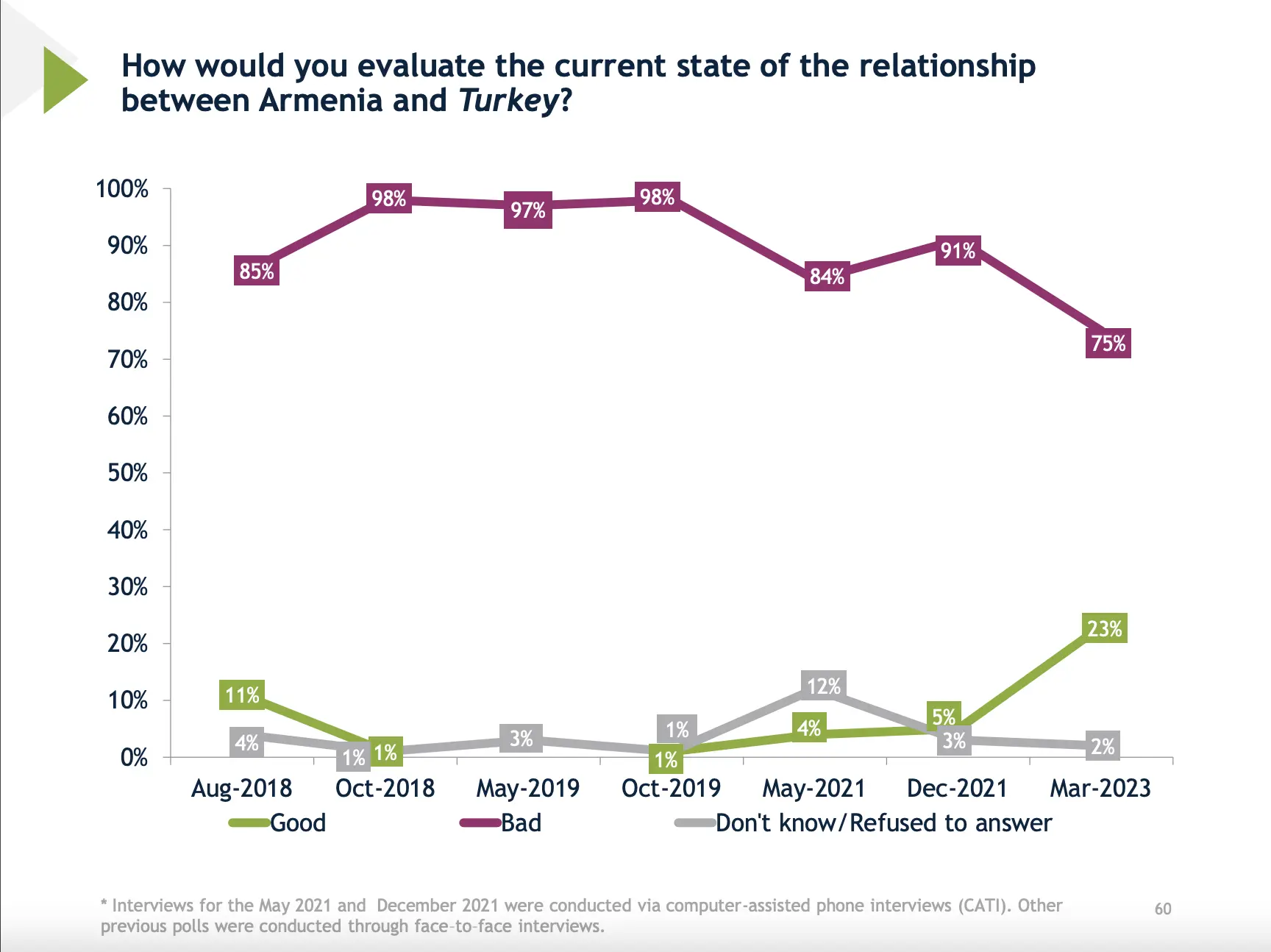
Hrant, the headline of the IRI Poll read as: “IRI Armenia Poll Shows Concerns over National Security, Sharp Divisions on Russia, Improving Relations with Turkey”
The first two points in their headline seem to be intuitive. But the third point, that relations with Turkey are improving, seems to be a bit in contrast with what is going on today. But the poll results apparently indicate that 23% believe that the current state of the relationship between Armenia and Turkey is “good”, which is an increase from December 2021.
Questions:
- What accounts for improvement in people’s perception of Turkey?
- Is the jump from 5% to 23% something to write home about, when in the same survey
Results of the Armenian Census
The Armenian Census Bureau released its preliminary numbers on April 23. On October 13, 2022, the permanent population is estimated to be 2.929 million people. The current residents amounted to 2.639 million.
The trend over a quarter century still looks down. The numbers were 3.2 & 3.0 million in 2001, and 3.0 & 2.9 in 2011.
Questions:
- Are people continuing to vote with their feet? Is a lack of confidence in the future of the country what is driving people out?
Here is the Armenian Census 2022 page on Facebook.
Topics from the Panelists
- Hovik: USAID funding for Armenian Media. (Note: the overall advertising budget for all major TV stations in Armenia).
- Hrant: External funding influencing Armenia’s foreign policy
Wrap-up
We hope you found our Week in Review helpful. We invite your feedback and your suggestions, you can find us on most social media and podcast platforms. Thanks to Laura Osborn for the music on our podcasts.
Guests
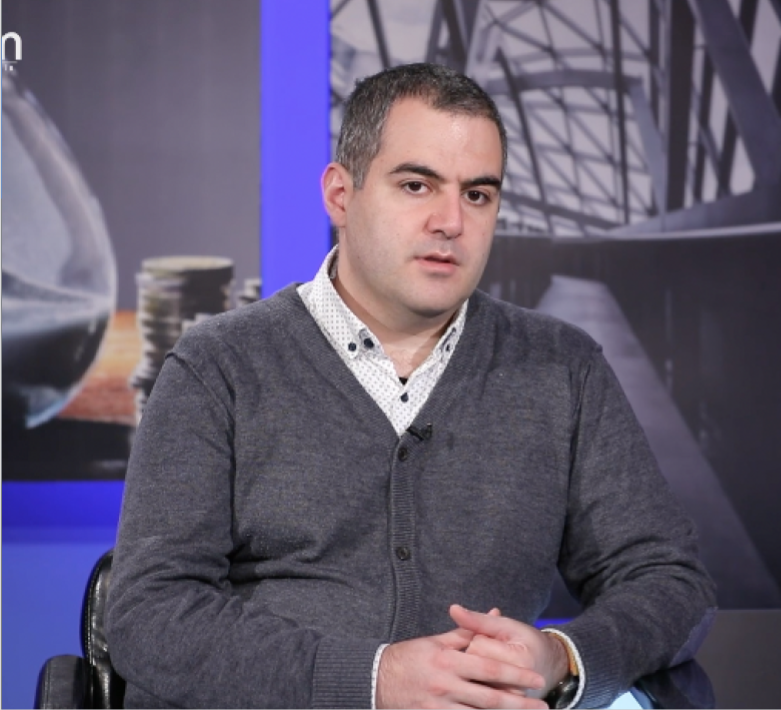
Hrant Mikaelian
Hrant Mikaelian, a political scientist and multidisciplinary researcher in social sciences based in Yerevan. He is also a senior researcher at the Caucasus Institute.
Hosts

Hovik Manucharyan
Hovik Manucharyan is an information security engineer who moved from Seattle to Armenia in 2022. He co-founded the ANN/Groong podcast in 2020 and has been a contributor to Groong News since the late 1990s.
Disclaimer: The views expressed by Hovik Manucharyan on the ANN/Groong podcast are his own and do not necessarily reflect the opinions of his employer or any other organization.

Asbed Bedrossian
Asbed is founder of the Armenian News Network Groong and co-founder of the ANN/Groong podcast.